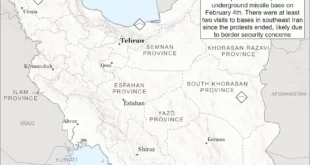Iraq welcomes Iran’s participation in a conference this week on regional security, Iraqi national security adviser Mowaffak al Rubaie said. Al Rubaie also said he hoped the meeting in Egypt would lead to better relations between Iran and the United States, a Reuters report said.
“It’s very important for Iraq to get the United States and Iran talking to each other,” al Rubaie told reporters at a meeting here.
He was in Tampa to attend a meeting of member nations of the US-led coalition fighting in Iraq and Afghanistan. US President George W. Bush is scheduled to address the meeting on Tuesday at US Central Command headquarters.
In Washington, US Secretary of State Condoleezza Rice said she would not rule out a meeting with her Iranian counterpart on the sidelines of the meeting.
“I will not rule out that we may encounter each other,” she said. “This is not a meeting about the United States and Iran, this is a meeting about Iraq and about what Iraq’s neighbors and interested parties can do to help stabilize the situation in Iraq,” she said.
“It’s a positive step,” al Rubaie said of Iran’s decision to attend the meeting. “We have to break this ice.”
US officials accuse Iran of training and supplying weapons to militias in Iraq, a charge Tehran denies. Relations between Iraq and Iran, both predominantly Shiite countries, have improved since the fall of Saddam Hussain.
Al Rubaie also dismissed US allegations about Iran interference in Iraq, saying that there existed no solid evidence to prove this.
Al-Rubaie said the US has not shared any proof with the Iraqi government that Iran is arming insurgents in the country.
“I’m saying this categorically: There is no solid evidence that Iran is supporting or helping al-Qaeda in any way,” he said.
Without Iran, Iraq’s largest and most influential neighbor, it is unlikely that any serious progress could have been made.
The Iraqi government is trying to arrange a potentially groundbreaking meeting between US Secretary of State Condoleezza Rice and her Iranian counterpart on the sidelines of the conference, Iraqi officials said yesterday.
Iraqi government spokesman Ali al-Dabbagh said Iraqi officials have been conducting a behind-the-scenes effort to persuade the US and Iran — Iraq’s two chief allies but themselves bitter foes — to schedule a bilateral meeting during the conference Thursday and Friday at the Red Sea resort of Sharm el-Sheik, Egypt, and he said he is optimistic that the initiative will succeed.
“We expect a meeting between Iran and the US, and this might help us in Iraq,” he said. “We are working hard to have this meeting, and we are optimistic it will happen.”
At present, Rice and Mottaki are scheduled to meet only in a group setting, and Iraq is the lone issue on the agenda. If a bilateral meeting does take place, the two will be free to discuss all issues dividing them, including the core problem of Iran’s effort to acquire nuclear weapons, al-Dabbagh said.
“There will be no conditions, no agenda. The issue of Iraq will give them a platform to discuss any mutual issues, and we are optimistic we can manage that,” he said. “This might help us in Iraq, because when relations are positive between Iran and the US, it will be positive for Iraq.”
But the prospect of an Iranian-US thaw may be wishful thinking on the part of Iraq. Iraq’s Shiite-led government, which relies on US support for its survival but also enjoys a close relationship with Iran, has watched with deep alarm as tensions have soared between its two closest friends, and it has made no secret of its hope that the two sides start talking.
If a bilateral meeting does occur, it would mark a significant milestone in the relationship between Washington and Tehran. There has barely been any official contact between the two nations since the 1979 Islamic revolution in Iran.
In a rare instance of cooperation, Iran and the United States worked together with Afghanistan’s neighbors to stabilize Afghanistan in the aftermath of the collapse of the Taliban in 2001, but those channels were severed after President Bush declared Iran a member of the “axis of evil” in 2002.
Iraq’s Foreign Minister Hoshiyar Zebari said there was a “high possibility” that arch foes Tehran and Washington would hold bilateral talks at the May 3-4 conference in Egypt.
Tehran said it would send a delegation headed by Foreign Minister Manouchehr Mottaki “with the aim of helping the Iraqi nation and government” for the meeting at Sharm el-Sheik.
The decision to attend “came after consultations between Iraqi officials and the Iranian president,” Foreign Ministry spokesman Mohammad Ali Hosseini said on Sunday.
Iraq, which says it needs its neighbors’ support to stem Shiite-Sunni violence spilling over to other countries in the region, had lobbied Tehran to attend the meeting.
Zebari said any talks between Iran and the United States would be important.
“I think it’s important, it would be a major breakthrough and any reduction in tensions will positively impact the situation in Iraq,” Zebari said in an interview.
“We don’t want Iraq to be a battleground for settling scores on other agendas at our cost. Really, this has been harming us, damaging us a lot,” he said.
The high-level conference will bring together Iraq’s neighbors, including Syria and Turkey, and world powers.
The meeting is a follow-up to one in Baghdad in March, where Iraq urged neighboring states to do more to end violence there.
“There is a gathering sense of the danger of Iraq failing, of chaos spilling across the region, sectarianism getting out of Iraq’s borders, civil war, the disintegration of Iraq,” Zebari said.
Shortly after the announcement that Iran would attend, Iran’s chief national security official, Ali Larijani, flew to Baghdad on Sunday for talks with al-Maliki and other senior Iraqi officials, the highest-ranking Iranian official to visit Iraq since the collapse of Saddam Hussein’s regime in 2003.
During their meeting, Larijani told al-Maliki that all countries that want stability in the region “have no choice but to support Iraq’s elected government.”
Al-Maliki replied that terrorist attacks in Iraq would hurt all countries in the region, including those supporting the Iraqi government, according to a statement by the prime minister’s office.
In Tehran, chairman of the Iranian parliament’s National Security and Foreign Policy Commission Alaoddin Boroujerdi, also said Iran’s failure to participate in Sharm el-Sheik would lay the Islamic republic open to criticism from the United States.
“Iran should attend the conference, actively and powerfully,” Boroujerdi said.
Iraq’s other neighbors as well as Egypt, Bahrain and representatives of the five permanent UN Security Council members have also agreed to attend the meeting.
Apart from security issues, the US and Iraq hope the conference will produce an agreement to forgive Iraq’s huge debts and offer financial assistance in return for an Iraqi pledge to implement political and economic reforms.
But Iraq’s Arab neighbors are expected to demand that the Baghdad government, dominated by Shiites and Kurds, do more to reach out to its own disgruntled Sunni Arabs before they pledge substantial aid.
The Iraqis, for their part, were anxious for the Iranians to attend to give them leverage against their Sunni-dominated neighbors and to help press their case that Sunni extremists, including al-Qaeda, pose the gravest threat to stability.
 Eurasia Press & News
Eurasia Press & News



